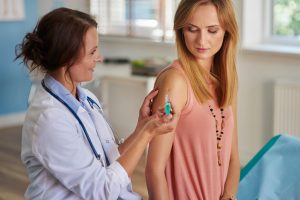Remember to Get Your Shots: It’s a Lifelong Process
Covid isn't all you should be vaccinated against
 Vaccinations have dominated the headlines since the start of the Covid pandemic more than two years ago. However, we’ve benefited from immunization since healthcare officials in the United States recommended the first batch of “routine” vaccines in the late 1940s. Over the nearly 75 years since, billions of lives have been saved by vaccines.
Vaccinations have dominated the headlines since the start of the Covid pandemic more than two years ago. However, we’ve benefited from immunization since healthcare officials in the United States recommended the first batch of “routine” vaccines in the late 1940s. Over the nearly 75 years since, billions of lives have been saved by vaccines.
And yet, for all the good they’ve done and continue to do, vaccinations are often mistakenly thought to be something limited to our childhood. While some vaccines are administered strictly during infancy and childhood, most need to be updated throughout our lives.
Reasons for Vaccinations
Ensuring we’re staying up to date with the recommended vaccines is important for several reasons. For one, the ease of travel these days has opened us up to literally a world of viruses we previously had little or no exposure to. For another, as we age, our immune response to previous vaccines gradually wanes. Vaccines are also constantly evolving, with newer, more effective versions becoming available regularly.
But perhaps the most critical reason is that we’re not living alone in the world. Being fully vaccinated best protects not only you but everyone you interact with and everyone they interact with. This includes children who aren’t yet old enough to be vaccinated and immunocompromised people who are susceptible to getting sick regardless of their vaccination status.
Recommended Vaccines for Adults
What follows is a brief but comprehensive rundown of current recommended vaccines. For the sake of simplicity, the guidance is for healthy adults. If you’re at greater risk than most for a certain condition, or you’d simply like to learn more about these vaccines, including their potential side effects, visit the Centers for Disease Control and Prevention’s (CDC) website, CDC.gov, and search “Adult Immunization Schedule.”
If you’re unsure of your vaccination history, or you know it’s incomplete, you won’t need to restart or add doses to a vaccine series, even if a long time has elapsed between doses. The best thing to do is schedule an appointment with your primary care physician to review your vaccination history. Also, while your doctor will have a complete record of your vaccinations, it’s worth asking if any need to be updated at your next appointment.
Covid
When to get it: Primary series vaccines for everyone 6 months and older, and boosters for everyone 5 years and older. A second booster is recommended for those 50 and older and for those who are 12 and older and are immunocompromised.
Worth knowing: If you’ve had Covid recently, don’t delay your next vaccine dose (primary or booster) by any more than two weeks from when your symptoms started or your first positive test. With the latest variants, immunity appears to be short lived.
Flu
When to get it: Generally, one shot annually, at the start of fall. However, some may benefit from multiple doses, depending on their age and health.
Worth knowing: If you’ve avoided getting a flu shot because you have an egg allergy, it’s time to reconsider. While the vaccines change every year to best protect against the latest flu strain, many of them won’t trigger your allergy.
Tetanus, Diphtheria, Pertussis
When to get it: One dose of Tdap (tetanus-diphtheria-pertussis) if you’ve never received one. It can be given at any time, regardless of when you last got a Td (tetanus-diphtheria) shot. This should be followed by either a Td or Tdap booster every 10 years. A single dose of Tdap is also recommended during every pregnancy.
Worth knowing: Pertussis (whooping cough) can be severe in newborns and infants. However, they won’t be fully immunized until around age 7. This makes it all the more important for the adults in their lives to be up to date with their own Tdap vaccination.
Varicella (Chicken Pox)
When to get it: Typically given as a two-dose series across infancy and early childhood. If you’ve never received the vaccine, or have no sign of immunity, you’ll be given two doses, four to eight weeks apart.
Herpes Zoster (Shingles)
When to get it: Two doses separated by two to six months for adults age 50 and older and immunocompromised people age 19 and older.
Worth knowing: If you previously received Zostavax, a singles vaccine that’s no longer available in the U.S., ask your doctor for Shingrix, the new vaccine. Studies have shown that the effectiveness of Zostavax wanes significantly over time.
Human Papillomavirus (HPV)
When to get it: A series of either two or three doses, depending on the age at initial vaccination, before becoming sexually active. Three doses are recommended for immunocompromised people.
Worth knowing: The vaccine works best when given before any exposure to HPV. Having a new sex partner, at any age, puts you at risk of getting a new HPV infection.
Pneumonia
When to get it: If you didn’t receive the vaccine in childhood, or your previous vaccination history is unknown, and you’re 65 or older, one dose of PCV20, the newest vaccine, is recommended. You could also be given one dose of PCV15, followed a year later by one dose of PPSV23.
Hepatitis A and B
When to get it: If you weren’t separately vaccinated for hepatitis A and B in childhood, anyone 18 and older is eligible for a combination vaccine that protects against both types. It’s given as three doses over six months.
Worth knowing: If you’re receiving the vaccine prior to traveling abroad, get it at least two weeks before departing.
Meningitis
When to get it: One booster dose is recommended between ages 16 and 18. A booster is also recommended if you find yourself among an outbreak and it’s been at least five years since your last vaccination.
You’re at Risk
We live in a bubble. Everyone reading this article has access to state-of-the-art healthcare, which manages to quell most outbreaks. As a result, it’s easy to believe that getting vaccinated is unnecessary.
But many of the diseases prevented by the vaccines highlighted here are still prevalent in certain parts of the world. And because we now live in a global world, those viruses and bacteria are capable of infecting us.
Prior to the pandemic, about 50,000 American adults died from vaccine-preventable diseases each year, according to the National Foundation for Infectious Diseases.
Protect yourself. Protect your family. Protect your neighbors.
 Raida M. Rabah, MD, is an infectious diseases specialist at Penn Medicine Chester County Hospital. Board certified in internal medicine and infectious diseases, Dr. Rabah completed a residency in internal medicine and a fellowship in infectious diseases at Wayne State University in Detroit. She’s been practicing in Chester County since 1994, the last 20 years with Brandywine Valley Infectious Disease Associates in Coatesville. ChesterCountyHospital.org.
Raida M. Rabah, MD, is an infectious diseases specialist at Penn Medicine Chester County Hospital. Board certified in internal medicine and infectious diseases, Dr. Rabah completed a residency in internal medicine and a fellowship in infectious diseases at Wayne State University in Detroit. She’s been practicing in Chester County since 1994, the last 20 years with Brandywine Valley Infectious Disease Associates in Coatesville. ChesterCountyHospital.org.
